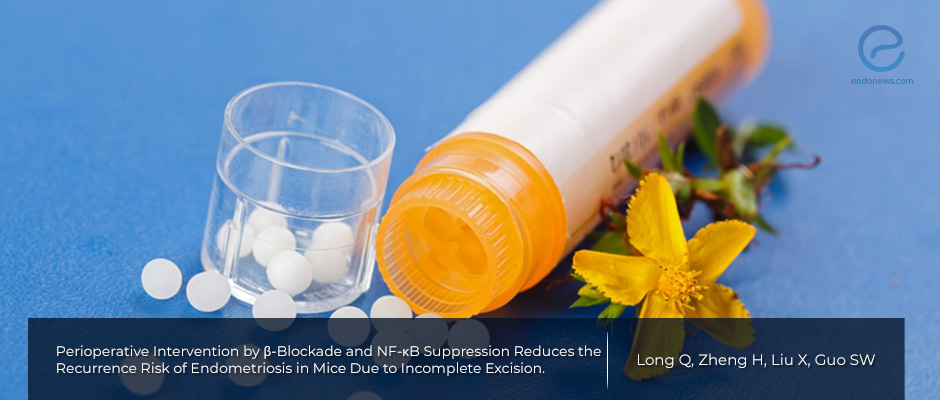Reducing the Risk of Recurrence After Endometriosis Surgery
May 7, 2019
A plant extract and a blood pressure medicine used before and after surgery may reduce the risk of endometriosis recurrence, mouse study suggests
Key Points
Highlights:
- NF-κB inhibitors and β-blockers, when used before and after endometriosis surgery, may reduce the risk of the disease recurring.
Importance:
- The risk of endometriosis recurrence following the surgery can be decreased if the results are replicated in human trials.
What's done here:
- Researchers generated a mouse model of endometriosis recurrence and treated them with "andrographolide", an NF-κB inhibitor and/or "propranolol", a β-blocker, before and after surgery to test their effect on the speed of growth of residual lesions.
Key results:
Andrographolide and/or propranolol, when used before and after surgery:
- significantly reduced the speed of growth of residual endometrial lesions
- reduced angiogenesis, epithelial to mesenchymal transition, and fibroblast to myofibroblast transdifferentiation.
- resulted in NF-κB suppression and progesterone receptor isoform B induction
- significantly attenuated the sensitization to pain caused by residual lesions
Limitations:
The experiments were conducted in a mouse model and more research is needed before it can be proved that the approach may also be beneficial in endometriosis patients.
Lay Summary
The use of compounds called NF-κB inhibitors and β-blockers before and after endometriosis surgery may reduce the risk of the disease recurring, according to a study conducted in a mouse model.
According to the study published in the journal Reproductive Sciences, the use of these compounds could delay the growth of residual endometriotic lesions that may be left behind during surgery. This, in turn, may reduce the risk of the disease recurring after surgery.
The recurrence of endometriosis after surgery is still a big problem. So far, researchers tried to identify risk factors, biomarkers, and medicines to be used after the operation to reduce this risk.
In the present study, a team of researcher at the University of Shanghai in China evaluated the potential benefits of andrographolide and propranolol.
In order to do so, they generated a mouse model of endometriosis recurrence where they removed some ectopic lesions, deliberately leaving behind residual lesions. They treated some of the animals with andrographolide, some with propranolol, and some with both compounds one hour before and one day after surgery. They also left some animals untreated as controls.
They then sacrificed all the animals two weeks later and assessed the state of their endometrial lesions. They found that the use of andrographolide and/or propranolol significantly reduced the speed of growth of residual endometrial lesions. They also found that the treatment led to a reduction in biological processes that play an important role in the development and spread of endometriosis such as angiogenesis or the formation of new blood vessels, and cellular differentiation.
Finally, the researchers reported that the treatments significantly attenuated enhanced pain response resulting from the presence of residual lesions, suggesting that andrographolide and/or propranolol, when used before and after endometriosis surgery, could potentially reduce the risk of the body becoming oversensitive to pain due to the presence of residual lesions.
The study produced promising results in terms of the potential of andrographolide and/or propranolol in reducing the risk of endometriosis recurring after surgery and even reducing pain experienced due to the presence of residual lesions. However, it is important to note that these are experiments conducted in mice models and more research is needed before this approach can be used in the clinic.
Andrographolide is a compound derived from the green chiretta plant, native to India and Sri Lanka and an NF-κB inhibitor that blocks the activity of NF-κB. NF-κB is a protein complex that is known to play an important role in the development of endometriosis.
Propranolol is a medication in the class of β-blockers sold under the brand name Inderal. It is used to treat conditions such as high blood pressure, irregular heartbeat, excess thyroid hormone levels, performance anxiety, and essential tremors. Propranolol is also a leading candidate as a novel anti-cancer agent.
Research Source: https://www.ncbi.nlm.nih.gov/pubmed/30764712
surgery endometriosis recurrence NF-κB inhibitors β-blockers mouse model

